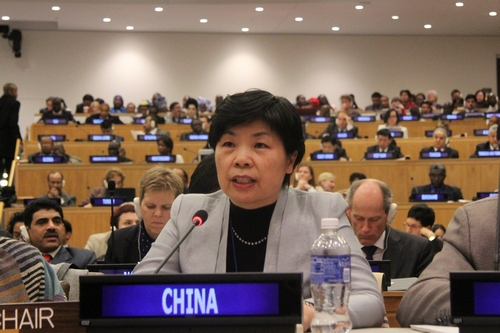| Statement by Vice Minister Cui Li of the National Health and Family Planning Commission of the People's Republic of China for Item 3 at the 47th Session of the UN Commission on Population and Development |
| 2014-04-07 06:21 |
|
Mr. Chair, First of all, on behalf of the Chinese delegation, I would like to extend our congratulations to you and the other members of the bureau on your successful election. I would also like to take this opportunity to express our sincere gratitude to the Secretariat of this meeting for your excellent preparation for the convening of this session. The Chinese delegation highly appreciates the Report on World Demographic Trends and the Report on the Framework of Action for the follow-up to the ICPD Beyond 2014 that the Secretary-General has presented to this session. The two reports not only evaluate the changes of demographic trends and progress in attaining the ICPD goals and objectives worldwide over the past two decades from a comprehensive and extensive perspective based on adequate information and accurate data, but also put forward the action framework on population and development beyond 2014, providing a good reference for formulating the UN development agenda beyond 2015. The Report on World Demographic Trends exhibits common features of the changes of the global demographic trends over the past 20 years, such as slowdown of population growth rate, declining of fertility rate and increase of life expectancy, etc. Meanwhile, the reports also pay attention to the unprecedented diversity and divergence of world demographic changes, with different countries and regions situated at different stages of demographic transition. Exclusive focus on population growth is past history. In the future world population will encounter greater complexities: enormous regional disparity of fertility level, continuous intensification of population ageing in developed countries, growing scale and scope of both international and domestic immigration, concurrent challenges of rapid urbanization and unprecedented ageing in Asia and Africa. Emerging population issues are reshaping the 21st century in various ways, with extensive consensus not yet reached regarding their importance, though. In the face of different new issues for priority solution and different new challenges to meet, countries of the world need seek common ground while reserving differences, concentrate on consensus reaching and jointly respond to population issues. The Report on the follow-up to the ICPD Beyond 2014 summarizes the progress to date and plans for the future, regarding the five comprehensive pillars as its foundation, namely, dignity and human rights, health, mobility and places, governance, and accountability. We believe it is a quite valuable framework recommendation. At the same time, we would like to emphasize the need to recognize the enormous gap in implementing the ICPD in different aspects and call on all national governments to make new commitments at the highest level, continue to follow the spirit and principles of the ICPD, and achieve its goals and objectives. For the future progress in population and development, we would like to make the following recommendations: (1) Pay greater attention to the relations between population dynamics and sustainable development, and incorporate the population issues into the national overall programme for socioeconomic development so that population will coordinate with socioeconomic development and match carrying capacity of resources and the environment; (2) Address population issues in a comprehensive manner to promote long-term balanced population development. The quantity, quality, structure and distribution of population will be taken into integrated consideration, with special concern paid to the impacts of changes of population structure on socioeconomic development along with active response to population ageing; (3) Stick to equitable provision of public services, and pace up efforts to achieve universal access to reproductive health and family planning services, with special attention paid to adolescent sexual and reproductive health education and services; (4) Develop sound partnership with NGOs and the private sector and deepen international cooperation including South-South cooperation and trilateral cooperation for the purpose of achieving common development and win-win situation Thank you, Mr. Chair. |
| |||||||||||||
| |||||||||||||
